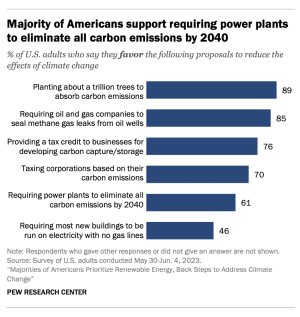After rejoining the Paris Agreement and passing the Inflation Reduction Act, the US has made a bold commitment to combat climate change. The goal is to cut greenhouse gas emissions in half by the end of the decade and achieve net-zero emissions by the middle of the century. Achieving this will require significant changes in various aspects of our lives, from household appliances to transportation and electricity generation. But are the American people ready to embrace this challenge?
According to a recent poll conducted by the Pew Research Center, the answer seems to be a resounding “no.” While there is general support for renewable energy, there is strong resistance when it comes to taking personal actions like replacing appliances. Furthermore, the partisan divide in support for climate action remains significant.
We need to take action!
Overall, the American public acknowledges the urgency of addressing climate change. Three-quarters of those surveyed believe that the US should actively participate in international efforts to reduce climate change, and two-thirds believe that developing alternative energy sources should be a top priority.

There is also widespread support for specific climate-friendly policies. Tree planting programs have nearly universal support, with 89 percent of those surveyed in favor. Similarly, there is strong support for requiring companies to address methane leaks from oil and gas wells. A majority (70 percent and above) also support policies that incentivize companies to limit emissions, such as tax credits for carbon capture development and emissions-based carbon taxes.
Surprisingly, over 60 percent of people even support the requirement for all power plants to have zero emissions by 2040, a crucial step towards President Biden’s climate goals.
As expected, there is a significant partisan gap on climate-related issues. A slim majority of Republicans prioritize fossil fuel production, including coal. However, younger and more moderate Republicans tend to break ranks and support measures like promoting carbon capture and engaging in international climate treaties.
Advertisement
In contrast, Democrats are nearly unified, with 90 percent of them believing that developing renewable energy should be the priority. Strong support for climate policies is widespread among left-leaning participants.
Opinions on the energy transition are mixed. While majorities or pluralities believe it will improve the environment, create job opportunities, and reduce the frequency of extreme weather events, there is an even split on whether it will increase the cost of power and destabilize the electric grid. Additionally, a plurality of respondents believe that it will lead to inflation in everyday goods.
In the face of devastating consequences, US public opinion is becoming increasingly polarized on the issue of climate change and dissatisfaction with available solutions is widespread. Although data suggests that Americans are more unified now than at any other time in recent history on the need for urgent action on climate change, they face a seemingly insurmountable challenge in finding satisfactory solutions to the problem.
The latest US opinion polls from Yale and George Mason Universities show that 87 percent of Americans believe that climate change is happening and that more than half believe that it is caused by human activities. This marks an 11 percent increase since March 2015. Furthermore, 77 percent of Americans now believe that we must take action to reduce climate change and its impacts, a 6 percent increase compared to four years ago.
In spite of this growing consensus, the public remains skeptical of the extent to which governments and corporations are taking sufficient action. 42 percent of Americans believe that the current President is not doing enough to address climate change, and 24 percent believe that he is doing nothing at all. The same polls also suggest that Americans lack faith in the concept of carbon taxes as an effective means of controlling greenhouse gas emissions from the most industrialized nations.
These results are unsurprising in a political climate of increased partisanship and a growing distrust of government. The issue of climate change is further complicated by a lack of agreement over the solutions proposed and the efficacy of each solution. Many believe that a universal solution should involve drastic technological advances; however, such efforts require significant investment and may not be widely accepted due to the cost and potential disruption to existing infrastructure.
Other popular solutions, such as solar and wind energy, are often seen to be less technologically advanced and more costly than traditional forms of power generation. However, these renewable sources of energy have become increasingly prevalent in recent years and now represent one of the most important opportunities to reduce global carbon emissions.
While the US public is clearly motivated to take action, there remain a number of challenges to creating effective solutions to climate change. Despite a large majority of public opinion generally preferring aggressive measures to reduce carbon emissions, the complexity of the issue and the lack of agreement on practical solutions only serves to widen the divide in opinion.
Furthermore, even if public opinion can be united and a suitable solution can be agreed upon, there is still the challenge of implementing government regulation or a new technological solution. Nevertheless, it is clear that the American public is ready and willing to take action on climate change, provided that the proposed solutions are economically viable, technologically advanced and widely accepted.




















